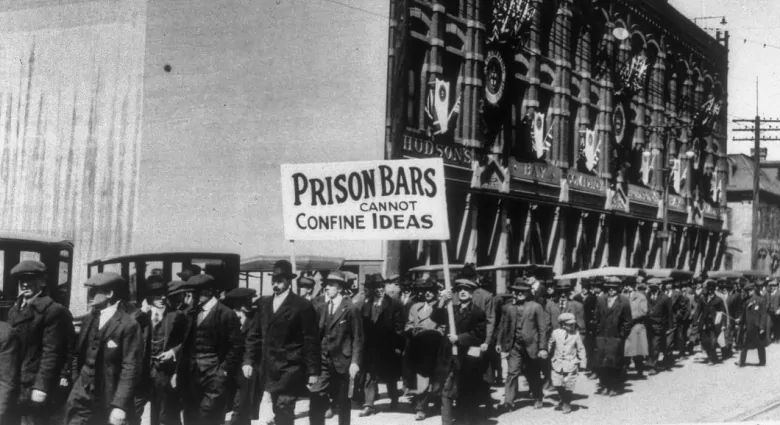
The resistance to Kinder Morgan’s pipeline to Vancouver is building. At the end of January British Columbia’s NDP government announced restrictions on any increase in diluted bitumen (dilbit) allowed to pass through BC’s coastal waters. In early March, in the biggest gathering so far against the pipeline, 10,000 people joined as First Nations stepped up their resistance.
The Tsleil-Waututh, the First Nation whose traditional territories include the Kinder Morgan pipeline terminal, have steadfastly opposed it. On March 10 they built a Kwekwecnewtxw, “a place to watch from,” overlooking Kinder Morgan’s tank farm. Will George, a Tsleil-Waututh member, explained the reason. “Danger threatens our people now, as Kinder Morgan tries to send hazardous diluted bitumen through our territory. Today we build our own Watch House to protect the Salish Sea and the people who depend on it.” The Watch House will be a base for further resistance.
The construction of the Kwekwecnewtxw was marked by a rally of 10,000 people lead by First Nations from across North America, many who spoke at the rally. Autumn Peltier, a 13 year old water ambassador from Wikwemikong First Nation in northern Ontario spoke for the 150 First Nations and US Tribes that have signed the Treaty Alliance Against Tar Sands Expansion. BC’s Grand Chief Stewart Phillip stated, “We are gathering today to send a clear message to Kinder Morgan and Justin Trudeau that Indigenous peoples across North America and British Columbians will never let this pipeline be built.”
In January, BC’s NDP government announced that it will not allow any increase in dilbit shipments until there are safe ways to deal with the inevitable spills. There are real reasons for the government’s concern. A report by the Royal Society of Canada called for more research and stated dilbit presents greater problems than standard crude oil as the “potential damage to the environment, waterfowl and fur-bearing animals is greater. Clean-up of heavy oils and bitumen is extremely difficult for both marine and inland spills.” This is a sensible precaution by the government, given the hundreds of thousands of jobs in fishing, tourism and other sectors that depend on clean water and beaches. Conversations for Responsible Economic Development estimates that 200,000 jobs in BC are at risk from a major oil spill.
This precautionary step by BC’s government provoked outrage from Alberta’s NDP government. It announced a ban on the import into Alberta of all BC wines, worth $70 million a year. The BC government threatened to take Alberta to court for breaking the free movement of goods between Canadian provinces. As well as the wine embargo there is a war of words with an Alberta government Minister, Deron Bilous, calling members of BC’s NDP government “a bunch of shitheads.” Recently the BC government partly retreated saying it will seek a court ruling on the legality of its proposed actions. This resulted in Alberta lifting the wine ban. However, the Alberta government has threatened to cut oil exports to BC in the future.
Tragically, the Alberta NDP government has drunk the tar sand industry’s propaganda kool-aid that the pipeline will provide permanent jobs. It won’t, at least not in the oil industry. It will increase employment for fire fighters, emergency responders and oil clean-up workers, due to spills and increased climate change.
The tar sands industry is shedding thousands of jobs as technology replaces workers. Suncor, one of the big tar sands companies, has just announced it is cutting 400 jobs, replacing truck drivers with automated trucks.
There will be a few thousand construction jobs for a couple of years, but Kinder Morgan itself says that the pipeline will provide only 50 permanent jobs in BC and 40 in Alberta. The price of oil is set on world markets so the idea that the pipeline will provide a boost to Alberta’s economy is a dream.
Unifor, the largest union in the oil sands, is opposed to the Kinder Morgan pipeline. Joie Warnock, Unifor’s Western Director is clear, “There is truly no shortage of reasons to reject this pipeline proposal. We stand with First Nations and environmental organizations who have made compelling cases against the pipeline.” Among the reasons for Unifor’s opposition are the risk to BC’s fishing industry as “the commercial fishery [would be] at risk of a catastrophic spill,” fear of job losses and the export of jobs. The existing refinery in Vancouver relies on regular crude oil from Alberta. When the pipeline switches to dilute bitumen it will be unable to refine it. The Alberta Federation of Labour was critical of the pipeline as it would export raw bitumen to refineries and factories in other countries, thus exporting jobs and most of the value-added in processing.
Unfortunately the NDP , like most soft-left governments, no longer argues for policies to provide good jobs. Once it was the left who fought for good jobs. Now, hypocritically, it is the right-wing who talk about jobs claiming that unrestricted capitalism is the way to job growth. Of course this is baloney as the experience of the last 30 years has been the shedding of jobs and closing manufacturing, and increasingly relying on precarious low-paid work.
Canada’s Prime Minister Trudeau is determined to see the pipeline built. He has attacked BC’s actions to protect its coast, stating the federal government “will ensure that the Kinder Morgan pipeline gets built” as he think it is in “the national interest.”
However, the assumption that a pipeline will deliver higher prices for bitumen and so provide tax revenue and jobs is very weak. Bitumen costs more than regular crude oil to push through a pipeline and to refine. The target market from Vancouver is East Asia so there are the additional costs of shipping it across the Pacific Ocean.
Trudeau’s “national interest,” is the interests of the oil industry. Of course he is also happy to see Canada’s only two NDP provincial governments fighting each other. His “national interest” ignores the environment and climate change, and does not provide good long term jobs. It is the total opposite of his election pledges to respect First Nations and protect the environment.
The concerns of the BC government over marine protection and the actions of Tsleil-Waututh add to the barriers to Kinder Morgan. However, Trudeau and the government of Alberta are presenting this as BC putting its narrow interest before jobs for all of Canada. There is an urgent need to counter this myth with a campaign across Canada that explains the realities of the costs, potential devastation and lack of jobs from the pipeline.
There are still outstanding court cases over the pipeline as well as the opposition on the ground. However, the safety of BC and protecting the global environment cannot rely on the courts alone.
Socialist Alternative will continue to point out that a leak in Vancouver harbour will have a devastating impact, closing the port, threatening hundreds of thousands of jobs and costing billions of dollars. In the light of this threat, we propose a one-day shutdown of the Metro Vancouver in a one-day general strike as a reasonable response. The idea is gaining support. If this was campaigned for by the BC Federation of Labour, the BC Indian Chiefs, the cities of Metro Vancouver and a wide coalition it would have a huge impact. It would hit Trudeau’s backers where they feel it – their wallets.




